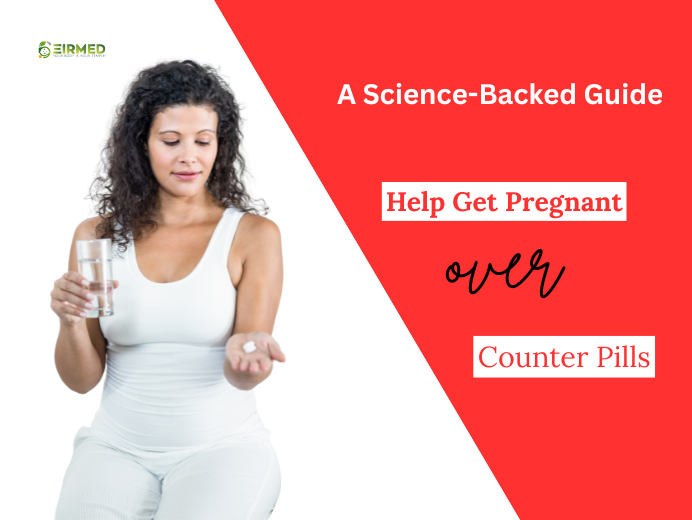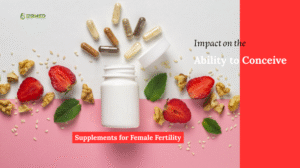Safe and Effective Help Get Pregnant Over Counter Pills

Can Over-the-Counter Pills Help You Get Pregnant? A Science-Backed Guide
Introduction: Using Over-the-Counter Pills to Boost Conception
Help get pregnant over counter pills are a popular choice for many couples looking to boost their fertility in a simple way. When couples are trying to get pregnant, the search for ways to improve success often leads to store shelves full of over-the-counter (OTC) vitamins and supplements. These pills promise to “boost fertility” or “enhance conception.” However, it is essential to look past marketing claims and rely only on what scientific research has proven to be effective and safe.
Scientific evidence divides these supplements into two main categories:
- Foundational Supplements: These are required by every woman who might become pregnant to ensure the basic health of the baby, regardless of fertility status.
- Targeted Supplements: These are specialized, high-dose treatments that only show benefits for people with a specific, diagnosed fertility problem (like poor egg quality or a hormonal imbalance).
When you’re actively trying to conceive, it’s natural to look for every possible advantage. Many couples wonder about those easily accessible over-the-counter (OTC) pills and supplements that claim to boost fertility. Do they truly work, or are they just hype?
At EIRMED, we believe in providing clear, research-based information. While there are no non-prescription “fertility drugs” designed to replace medical treatments, a specific category of OTC products—dietary supplements—can play a vital, supportive role in optimizing both male and female reproductive health. This guide breaks down what science says about these supplements and how they can be a helpful part of your conception journey.
The Role of Supplements in Optimizing Fertility
It is important to understand that over-the-counter supplements are generally nutritional supports, not prescription medications like Clomid or Letrozole, which directly stimulate ovulation or adjust hormones.
However, research shows that deficiencies in certain vitamins and minerals can hinder the quality of eggs and sperm, affect hormonal balance, and disrupt the menstrual cycle.1 Taking the right supplements can correct these deficiencies and provide the essential building blocks for a healthy conception. This is often the first step many fertility specialists recommend.
1. Key Supplements for Female Fertility
A woman’s journey to conception requires good egg health, regular ovulation, and a supportive uterine environment.
| Supplement | What it is & How it Helps (Science-Based) |
| Folic Acid (Folate/Vitamin B9) | Crucial for DNA Synthesis. Most famous for preventing neural tube defects in a developing baby, sufficient folate intake before conception is vital for the health and integrity of egg DNA. Health organizations recommend all women of childbearing age supplement with it. |
| Coenzyme Q10 (CoQ10) | Powerful Antioxidant. CoQ10 levels naturally decline with age. This antioxidant is essential for energy production within the egg cell. Studies suggest CoQ10 supplementation may improve egg quality, especially in women with diminished ovarian reserve or those over 35. |
| Myo-Inositol | Supports Ovarian Function. A naturally occurring sugar that is particularly effective for women with Polycystic Ovary Syndrome (PCOS). Research indicates myo-inositol can help improve insulin sensitivity, which often leads to more regular ovulation and better egg quality. |
| Vitamin D | Hormonal Regulation. Low Vitamin D levels are common and have been linked to poorer fertility outcomes. Maintaining sufficient Vitamin D is associated with improved hormone balance and higher pregnancy rates. |
2. Essential Supplements for Male Fertility
It takes two to tango! Male factor infertility, often related to sperm health (count, motility, and morphology), is a common issue. Antioxidant-rich supplements can protect sperm from cellular damage, known as oxidative stress.2
| Supplement | What it is & How it Helps (Science-Based) |
| Zinc | Sperm Production and Function. Zinc is critical for the structure and function of sperm. Deficiency is associated with low testosterone levels, poor sperm quality, and reduced motility. |
| L-Carnitine and Acetyl L-Carnitine | Sperm Energy and Motility. These amino acids help convert fat into energy and are highly concentrated in healthy sperm. Studies suggest supplementation can improve sperm motility (how they swim) and overall function. |
| Coenzyme Q10 (CoQ10) | Sperm Protection. As an antioxidant, CoQ10 helps protect sperm DNA from oxidative damage, which is key for maintaining high-quality sperm concentration and motility. |
| Selenium & Vitamin E | Antioxidant Team. Selenium is an essential trace element that, when combined with Vitamin E, acts as a powerful antioxidant, protecting the sperm cell membrane and improving sperm motility. |
Targeted Supplements for Female Fertility (By Diagnosis)

Certain OTC supplements have shown powerful results, but only in women who have been diagnosed with a specific underlying condition. These are high-dose therapies that should be discussed with a specialist.
2.1 Coenzyme Q10 (CoQ10): For Improving Egg Quality and Reserve
CoQ10 is a natural antioxidant that acts as an “energy booster” for cells. It is vital for the mitochondria, the powerhouses inside cells, and is especially important for egg cells, which require a lot of energy for successful fertilization and early development.
When Science Supports Its Use
Research strongly links CoQ10 supplementation to better outcomes for women over 35 or those with Diminished Ovarian Reserve (DOR)—meaning a low number of remaining eggs.
Studies have shown that CoQ10 pre-treatment, often when combined with fertility treatments like IVF, is significantly correlated with :
- Higher Clinical Pregnancy Rate: Women who took CoQ10 had an elevated chance of achieving a clinical pregnancy.
- Improved Egg and Embryo Quality: It helps produce more retrieved eggs and optimal embryos.
- Reduced Miscarriage Rate: Supplementation has also been linked to a lower risk of miscarriage.
Effective Dosage:
The dosages found to be effective in scientific research are high, often around 600 mg daily. This high-dose approach usually needs to be taken for at least 60 days to affect the maturing egg.
2.2 Myo-inositol: For Regulating Polycystic Ovary Syndrome (PCOS)
Myo-inositol (MI) is often recommended for women diagnosed with Polycystic Ovary Syndrome (PCOS), a common hormonal disorder that leads to irregular or absent ovulation.
How It Works:
MI helps the body become more sensitive to insulin. By improving this insulin response, MI can help to balance hormones, which in turn helps restore regular menstrual cycles and spontaneous ovulation.
Scientific Evidence:
For women with PCOS, MI can help regulate the menstrual cycle and may improve the success rate of spontaneous pregnancies. When used during IVF, MI has also been shown to improve the fertilization rate. The recommended dose typically ranges from 2 to 4 grams daily.
2.3 Vitamin D: Addressing Deficiency for Better Outcomes
Vitamin D is crucial for overall immune and hormonal function. Scientific reviews have associated low levels of Vitamin D (below 30 ng/mL) with an increased risk of infertility.
When It Helps:
Supplementation appears to improve the clinical pregnancy rate, but primarily in infertile women who have a confirmed Vitamin D deficiency. For women with PCOS, Vitamin D supplementation has been shown to contribute to higher pregnancy and ovulation rates.
- Crucial Step: Because the benefit is tied directly to correcting a confirmed low level, blood work is highly recommended before starting supplementation. The effective daily dose can vary widely depending on the severity of the deficiency.
The Importance of a Prenatal Vitamin
Before focusing on any specialized supplement, every woman trying to conceive should start taking a high-quality prenatal vitamin.3 Prenatals are specifically formulated to provide the basic, necessary levels of nutrients—especially Folic Acid, Iron, and other B vitamins—that support both pre-conception health and early fetal development. It’s an easy, foundational step to ensure your body has what it needs.
A Word of Caution: Talk to Your Doctor
While most fertility supplements are safe and beneficial in recommended doses, they are not a substitute for a medical diagnosis.
- If you have a known medical condition like PCOS, endometriosis, or a male factor diagnosis, your fertility journey will require guidance from a specialist.
- Certain herbs or high doses of vitamins can interact with medications or even be harmful.4 For example, high levels of Vitamin A can be toxic.
Always discuss any supplement regimen with your healthcare provider or a fertility specialist to ensure it’s safe and right for your unique situation. Your doctor can also test for nutrient deficiencies to tailor your supplement plan more effectively.
Recommended YouTube Video
Title: Over-The-Counter Supplements May Improve Fertility
Channel: CBS Boston
Short Description: The video discusses an over-the-counter supplement called Preg Prep, which is marketed to improve the odds of conceiving [00:00]. The supplement has two components: Vita Prep (a multivitamin with B12, D, and folic acid) and Fertile Prep (which supposedly helps sperm reach the egg) [00:14]. An infertility specialist notes that there is no clear scientific evidence that the components work, either alone or in combination, suggesting it may be a waste of money better spent on proven, FDA-approved medications and therapies [00:38]
Disclaimer
The information provided by EIRMED on over-the-counter pills and supplements for fertility is for informational and educational purposes only. It is not intended as medical advice, diagnosis, or treatment. Dietary supplements are not regulated by the FDA with the same rigor as pharmaceutical drugs.6 Always consult with a qualified healthcare professional, such as your OB-GYN or a Reproductive Endocrinologist, before starting any new supplement, especially when trying to conceive or if you have any pre-existing medical conditions. EIRMED is not responsible for any adverse effects resulting from the use of products mentioned.

Eirmed is an informational platform dedicated to providing reliable, science-based insights on male and female fertility, reproductive health, and natural conception.
